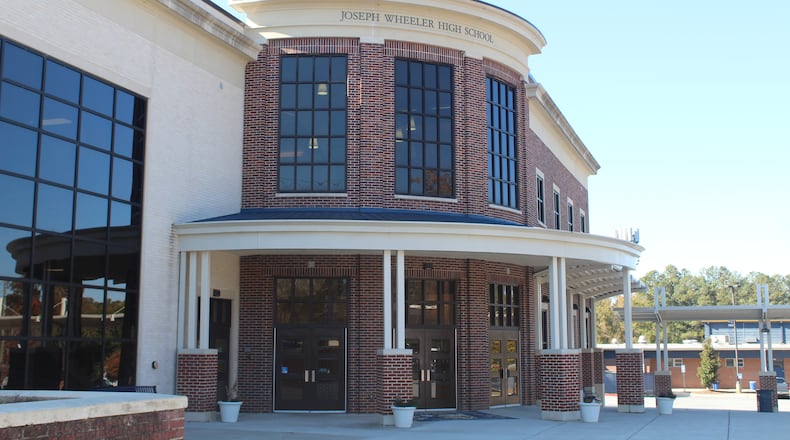In a controversial vote that split along race and party lines, the Cobb County School Board voted to disband a committee created to review schools named after a Confederate general and a man from a slave-owning family who signed the Declaration of Independence, saying the work belongs to elected officials.
The move led one school board member to call the action an example of systemic racism.
The committee, created over the summer, had not yet been formed. It grew from calls by students and community members to rename Wheeler and Walton high schools. Two petitions were created calling for a name change for both Walton and Wheeler, both of which were signed by thousands of people.
Board Chair Brad Wheeler said he’s been talking to people all over the county and he’s come to the conclusion that the school board should not delegate its authority to a committee because the community elected them to make those decisions. He had earlier sided with the board’s three Black Democrats in the vote to create the committee.
“This is a board decision that we have been elected to do, not a committee,” Wheeler said.
Wheeler added the issue of renaming the two schools can come up at a later date, but it is not currently scheduled for a discussion.
The dissolution of the committee was approved Thursday during the board’s work session with a 4-2 vote, with Black Democrats Charisse Davis and Jaha Howard voting in opposition. Wheeler, David Banks, David Chastain and Randy Scamihorn, the board’s white Republican members, voted to disband the committee. David Morgan, the board’s third Black Democrat, was not in attendance.
In the earlier vote on Aug. 20 to form the committee, members voted 4-3 with Wheeler joining Davis, Morgan and Howard in favor of the creation. Banks, Chastain and Scamihorn voted against the proposal. The committee would have included three board members and one resident from each of the seven board posts.
No members had been named to the committee nor had any meetings been scheduled.
Davis, who represent both schools on the board, said she was confused by Wheeler’s decision because the committee would have included three school board members. She said she was disappointed that the board is “moving on without any discussion” about the committee.
Howard said he’s uncomfortable with the school board’s decision, which keeps in place the names of schools christened after Confederate soldiers.
“We didn’t even complete the job and we are going to undo something that was half-done,” he said.
Howard went on to say that the board is changing the rules because it didn’t want to undertake a “complicated” process. This, he said, was a “blatant example of systemic racism,” a form of racism that is embedded as normal practice within an organization or society.
The board’s decision was also criticized by three Wheeler High School students who spoke to the board during its meeting Thursday. Nina Kesava, a senior at Wheeler, said she was appalled by the lack of action taken by the Republicans on the school board. She added that the students’ attempts to have a conversation with the school board have been ignored.
Caroline Hugh, another Wheeler senior, pointed out the high school opened bearing the Confederate general’s name in 1965, the same year Cobb County integrated its schools and 11 years after the landmark U.S. Supreme Court Brown vs. Board of Education ruling that outlawed segregation in public schools.
“The school was not named to honor a general,” she said. “It was named to intimidate and ostracize, to display hostility towards the new (Black) students in the 60s and to misrepresent our students today.”
Wheeler High School is named after Joseph Wheeler, who served as an officer in the Confederate Army. After the South was defeated in the Civil War, Wheeler served as a Congressman from Alabama and in the U.S. Army in the Spanish-American War and the war in the Philippines, the National Park Service states.
George Walton signed the Declaration of Independence and served as the second governor of the Peach State, according to the National Governors Association. The petition for renaming that school, which opened in the 1970s, said Walton came from a slave-owning family “and spent his political career championing white supremacy in Georgia by stripping Native Americans time and time again of their land,” said creator Joseph Fisher.
As of Oct. 6, Wheeler High School had 2,308 students, the majority of whom are Black, according to the Georgia Department of Education. Broken down by race Wheeler had 576 white students, 861 Black students, 478 Hispanic students, 308 Asian students and 85 students who were Native American, Pacific Islander and were of two or more races.
Walton’s student population is a little larger with 2,709 students, according to state Department of Education records. Unlike Wheeler, more than half of its students are white at 1,737 students. Asian students follow at 550, Hispanic students at 181, Black students at 152 and students of two or more races, Pacific Islander or Native American at 89.
Editor’s note: a previous version of this article referred to George Walton as a confederate general. Walton signed the Declaration of Independence and was the second governor of Georgia.
About the Author
Keep Reading
The Latest
Featured



